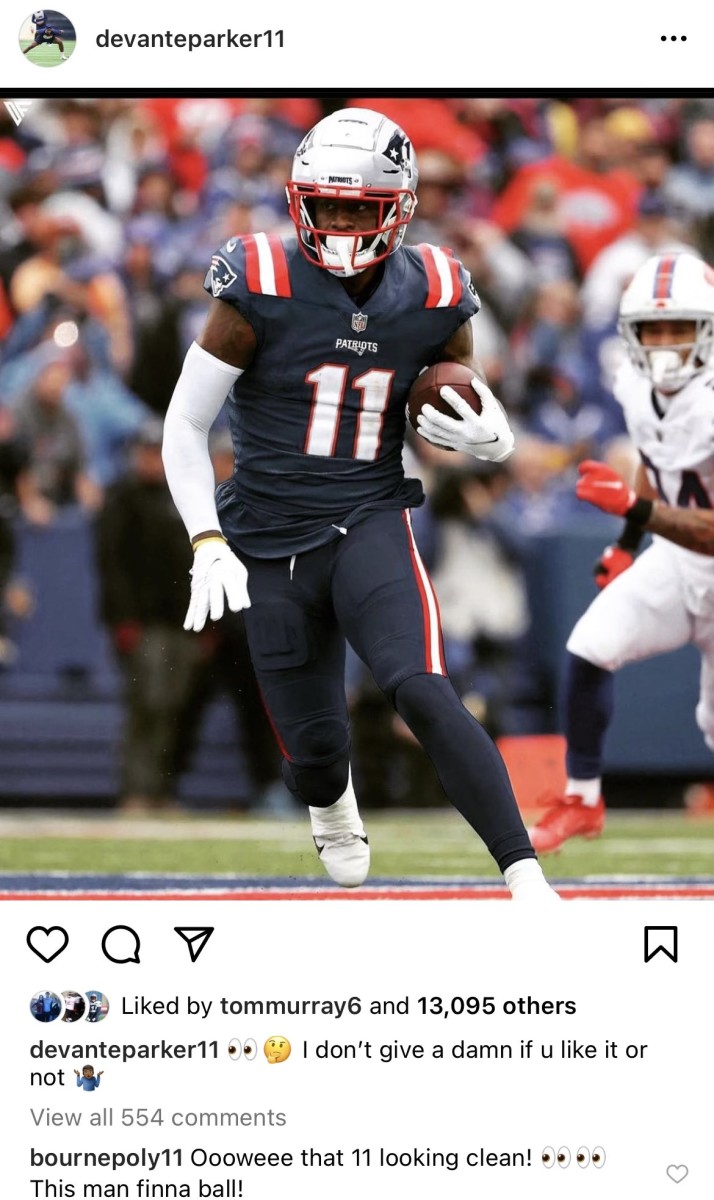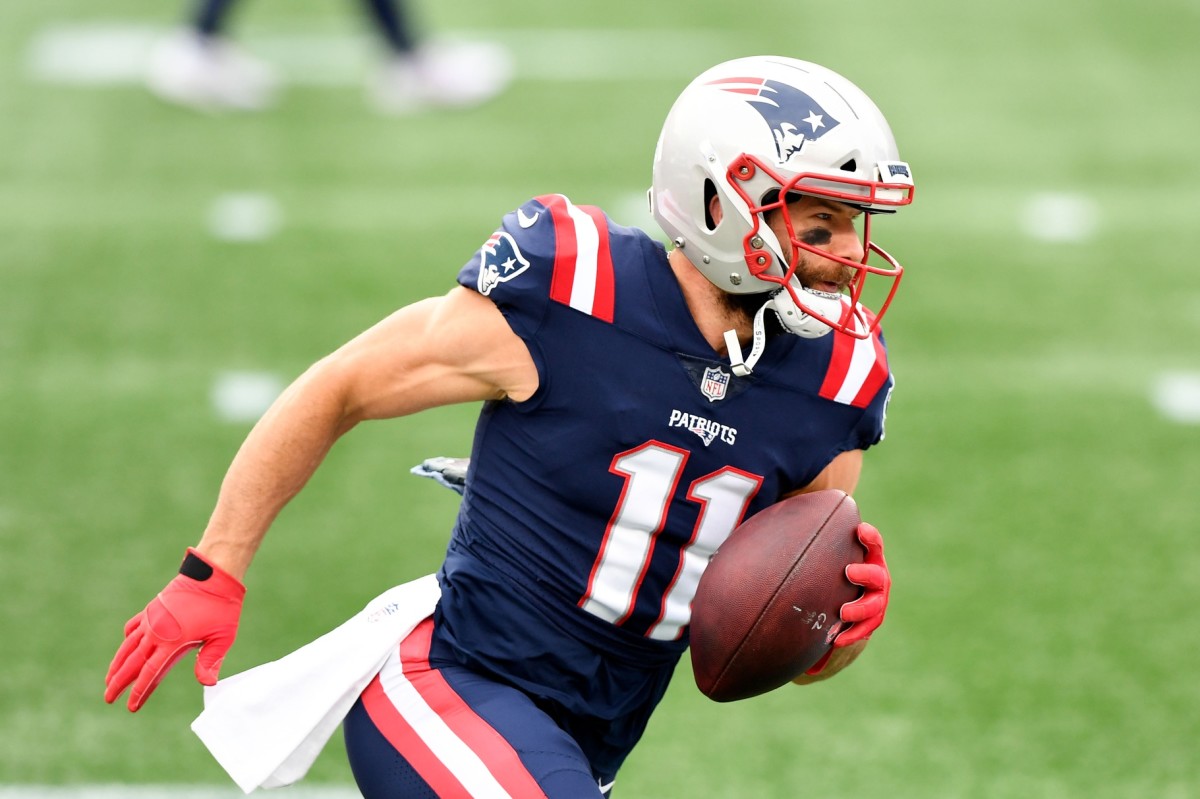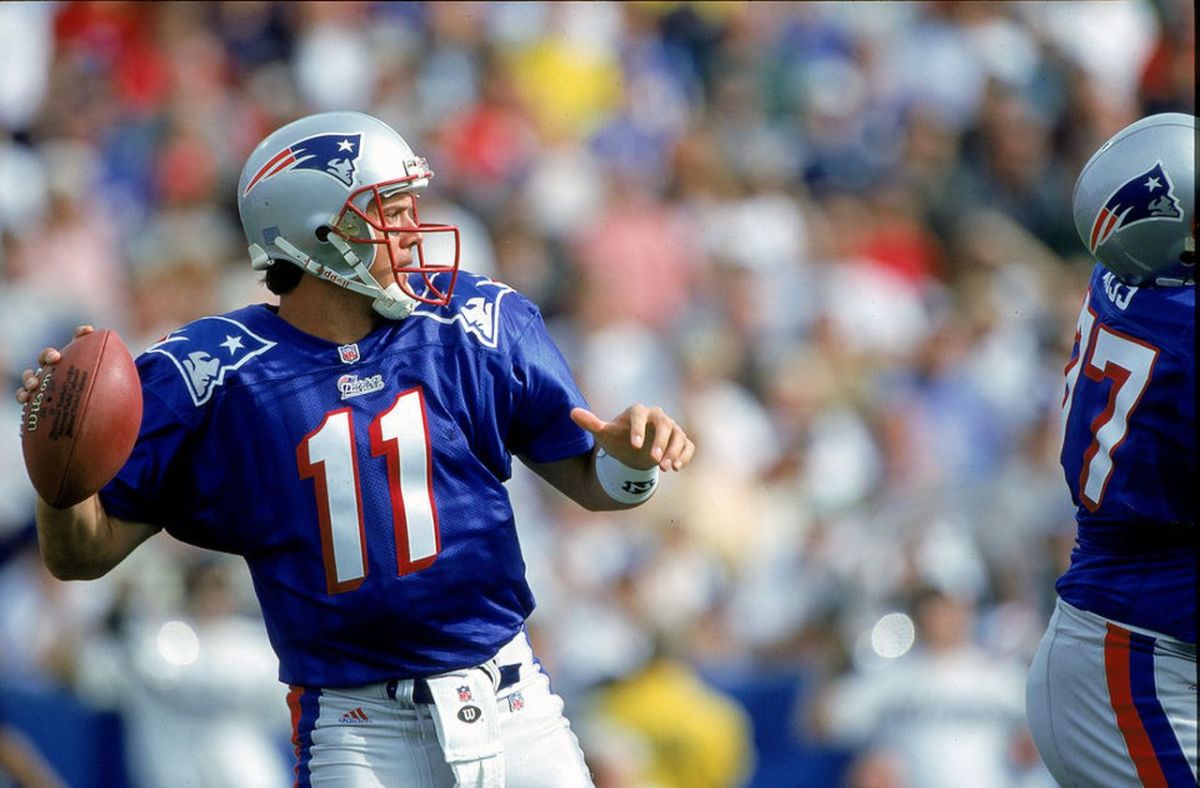Eason ... Bledsoe ... Edelman ... Parker? New Patriots WR Claims Revered No. 11
For any professional athlete, the greatest individual honor which they may earn is to be enshrined in their respective sports’ hall of fame. Perhaps a close second might be having their jersey retired by the team for which they are most well-known.
Despite being one of the winningest franchises in league history, the New England Patriots have retired only seven numbers: John Hannah (73), Gino Cappelletti (20), Mike Haynes (40), Steve Nelson (57), Bruce Armstrong (78), Jim Lee Hunt (79) and Bob Dee (89). Only Hannah and Haynes are in the Pro Football Hall of Fame.
While it is a certainty that team legend and former quarterback Tom Brady’s number 12 will receive the honor, it appears that another beloved former Patriot’s jersey number will instead be back in rotation for 2022.
Earlier this month, the Patriots acquired former Miami Dolphins’ wide receiver DeVante Parker. In spite of some concern over his injury history, Parker has the talent to become the Patriots’ top option at the position. His skill-set provides the Pats with the perimeter presence to add a new dimension to their receiving corps, as well as a bona fide pass catcher on the boundary for quarterback Mac Jones.
Although New England’s fan base is excited to see Parker in a Patriots uniform, they may be a bit surprised, perhaps even uncomfortable, to see him wearing a familiar and revered number — 11 — last worn by wide receiver, fan-favorite and Super Bowl XLIII MVP Julian Edelman.

Since announcing his retirement in April of 2021, Patriots fans have been clamoring for the retirement of Edelman’s jersey. Despite former practice squad kicker Riley Patterson having briefly worn the number in 2021, the number 11 has not been donned in a game setting since Edelman’s last game in a Patriots uniform in October 2020. Based upon Parker’s recent Instagram posting (which has not been confirmed by the team), that fact will seemingly be changing during the upcoming season.
As expected, fans may have mixed reactions to watching another wide receiver wearing number 11 on game day. Yet, it should be noted jersey number retirement is a tricky proposition in pro football. With an obvious need for numbers to assign, many franchises have opted for ‘rings of honor’ or organizational halls of fame to provide adequate honors for the team’s most prominent stars. As such, Edelman’s fans may take solace in his inevitable fitting for a Patriots Hall of Fame red jacket, even if number 11 is worn by Parker in 2022.
Edelman was far from the first player to wear the number for the Patriots. Here is a brief look at its history and the Patriots who have proudly worn it throughout the years.

Julian Edelman

Drew Bledsoe

Tony Eason
Julian Edelman
Originally drafted by New England in the seventh round of the 2009 NFL Draft, Edelman converted to the wide receiver position after having played quarterback both at the College of San Mateo and at Kent State University. He appeared in a total of 157 games (both regular season and postseason) and was never a stranger to the endzone during that timespan. In fact, Edelman has played a role in 48 total touchdowns in his eleven-year career, including two as a passer and four as a punt returner. He finishes his career with 620 regular season catches for 6,822 yards and 36 touchdowns. However, Edelman’s star shined its brightest in the postseason. He totaled 118 receptions for 1,442 yards and 5 touchdowns in the playoffs, second on the league’s all-time list behind Hall of Famer Jerry Rice’s 151 receptions for 2,245 yards.
Drew Bledsoe
Bledsoe was selected by the Patriots as their first overall selection in the 1993 NFL Draft. Considered the face of the Patriots franchise during his nine seasons with the team, he helped bring the franchise to prominence from 1993 to 2001. With Bledsoe under center, the Patriots ended a seven-year postseason drought, qualified for the playoffs four times, clinched their division twice, and made one Super Bowl appearance in Super Bowl XXXI. He was also named to three Pro Bowls and became the youngest quarterback to play in the NFL's all-star game with his 1995 appearance.
Tony Eason
Eason played for eight seasons in the NFL, primarily with the Patriots. He was selected 15th overall by New England in the 1983 NFL Draft. Eason served as New England's primary starter from 1984 to 1986, where he helped the team make their Super Bowl debut in Super Bowl XX. Competing as the starter with Steve Grogan throughout his Patriots tenure, Eason was released during the 1989 season. He spent his final two seasons as a backup with the New York Jets.

Joe Kapp

Shawn McCarthy

Ed ‘Butch’ Songin
Joe Kapp
Kapp initially signed with the Boston Patriots in 1970 on a four-year deal which made him the highest paid player in the league at that time. However, both Kapp and the 1970 Patriots underperformed, with the team logging the league's worst record at 2–12. With the top pick in the 1971 NFL Draft, the Patriots selected Heisman Trophy-winning quarterback Jim Plunkett of Stanford. Though Kapp reported to the newly-renamed New England Patriots' training camp in 1971, he left the team after refusing to sign a standard contract. After this incident, Kapp never played another down for the Pats, or any team; ending his 12-year career in professional football.
Shawn McCarthy
McCarthy was drafted by the Atlanta Falcons in the 12th round of the 1990 NFL Draft, later finding his way to New England. The former quarterback turned punter played his college football at Purdue University.
McCarthy’s shining moment with the Patriots came on November 3, 1991 against the Buffalo Bills, when he placed a 93-yard punt which was downed inside the Bills’ one-yard line. The punt set a Patriots franchise record. It was also the third longest in NFL history and the longest since the AFL-NFL merger. In Week 13 of the 1991 season, McCarthy threw a complete pass on a fake punt to tight end Ben Coates for an 11-yard gain. It was the only pass attempt of his NFL career.
Butch Songin
Songin had ties to the New England areas throughout his lifetime. Having been the starting quarterback for the Boston College Eagles, he signed with the Boston Patriots (then of the American Football League) in 1960. In September, Songin played in the first ever AFL game, against the Denver Broncos. In his first season with Boston he completed 187 of 392 passes for 2,476 yards, 22 touchdowns, and 15 interceptions. In 1961, he split starting duties with Babe Parilli. He completed 98 of 212 passes for 1,429 yards, 14 touchdowns, and 9 interceptions. Songin died of cancer May 26, 1976 at his home in Foxboro, Massachusetts at the age of 52.
Dick Shiner
Shiner arrived in New England midway through the 1973 season, as a backup to Jim Plunkett. He appeared in one game completing two of four passes as the Patriots blew out Houston 32-0 in week 11. His only appearance for the Patriots in 1974 came during the regular season, with the Pats holding a 35–3 lead against the Baltimore Colts. After leading the Patriots on an 80-yard touchdown drive, Shiner took himself out of the game to give third-string quarterback Neil Graff a chance to play in Graff's first NFL regular-season contest. In an interview with Mike Kingaman of the Baltimore Sun, conducted four decades later, Shiner said, "I wanted Neil Graff to get experience. Neil was a good kid, and I knew my time in the NFL was coming to an end."
-21b50e1add3cea81c17ff685f7d8dd59.jpeg)